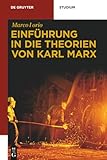Einführung in die Theorien von Karl Marx / Marco Iorio.
Material type: TextSeries: De Gruyter StudiumPublisher: Berlin ; Boston : De Gruyter, [2012]Copyright date: ©2012Description: 1 online resource (350 p.)Content type:
TextSeries: De Gruyter StudiumPublisher: Berlin ; Boston : De Gruyter, [2012]Copyright date: ©2012Description: 1 online resource (350 p.)Content type: - 9783110269697
- 9783110269703
- 335.4092 23
- B3305.M74 I56 2012eb
- online - DeGruyter
| Item type | Current library | Call number | URL | Status | Notes | Barcode | |
|---|---|---|---|---|---|---|---|
 eBook
eBook
|
Biblioteca "Angelicum" Pont. Univ. S.Tommaso d'Aquino Nuvola online | online - DeGruyter (Browse shelf(Opens below)) | Online access | Not for loan (Accesso limitato) | Accesso per gli utenti autorizzati / Access for authorized users | (dgr)9783110269703 |
Frontmatter -- Vorwort -- Inhalt -- Einleitung -- 1 Leben und Werk -- 2 Der geschichtsphilosophische Hintergrund -- 3 Produktivkräfte -- 4 Produktionsverhältnisse -- 5 Überbau -- 6 Erklärung -- 7 Funktionen -- 8 Gesellschaft -- 9 Klassenkampf -- 10 Revolution -- 11 Erkenntnis und Moral -- 12 Staat und Gesellschaft -- 13 Zur Kritik der Politischen Ökonomie -- 14 Marxismus nach Marx -- Literaturverzeichnis -- Personenregister -- Sachregister
restricted access online access with authorization star
http://purl.org/coar/access_right/c_16ec
Der profilierte Marx-Forscher Marco Iorio liefert eine kundige Einführung für jeden, der unvoreingenommen wissen will, was Karl Marx denn nun wirklich zu sagen hat.In dieser kritischen und konstruktiven Gesamtinterpretation kommen alle wichtigen Themen zur Sprache: von Geschichtsphilosophie und Gesellschaftstheorie über ökonomischer und politischer Theorie bis hin zu revolutionstheoretischen und moralphilosophischen Problemstellungen. Die berücksichtigte Sekundärliteratur deckt sämtliche aktuell relevanten Strömungen ab, darunter analytischer Marxismus, Postkolonialismus, Poststrukturalismus, Post- bzw. Neomarxismus.Damit eignet sich die Einführung auch hervorragend als Kursbuch für Lehrveranstaltungen und als studienbegleitende Lektüre.
The distinguished Marx researcher Marco Iorio offers a comprehensive introduction for all readers who want a neutral consideration of what Marx really had to say. This critical and constructive overall interpretation discusses Karl Marx's most important issues: philosophy of history, social theory, economic and political theory, theory of revolution and moral philosophical problems.The author incorporates secondary literature from currents that are relevant at present, including analytical Marxism, post-colonialism, post-structuralism, post or neo-Marxism. Therefore, the book may also serve as an excellent basis for teaching and as course-related literature.
Mode of access: Internet via World Wide Web.
In German.
Description based on online resource; title from PDF title page (publisher's Web site, viewed 08. Jul 2019)


